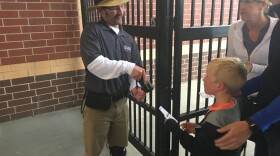People who were catastrophically injured in car crashes rallied in front of Citizens Insurance headquarters in Howell on Tuesday, then in front of the Livingston County courthouse building.
The crowd included family members, friends, and caregivers, all hoping to continue to bring attention to the crisis of care affecting auto accident patients after the passage of the 2019 auto no-fault law, which cut payments to caregivers by 45%.
Many of the care agencies have closed, or are no longer accepting patients with no-fault insurance as payment, because they cannot cover their costs of providing care with just over half their former revenue. A recent survey by the Michigan Public Health Institute found that at least 6,800 people in Michigan have lost some or all of their care.
Rally attendees marched and chanted, some with signs directed at state Senator Lana Theis, the Republican chair of the Senate Insurance and Banking Committee. Signs said, "Senator Theis, your obstruction is killing us," and "You say 'move on,' but my brain injury won't let me!"
Theis, as the insurance committee chair, has blocked bills to amend the state's no-fault laws. In the House, similar bills have been blocked by House Speaker Jason Wentworth, who said of the no-fault crisis last spring, "At this point, it's time to move on."
Laszlo Szaley, a U.S. Marine, was injured in a car crash in 2012. He suffered a spinal cord injury and a traumatic brain injury. Szaley said he needs 24/7 care, but his insurance company, Citizens, will no longer cover it.
"I've had very serous injuries from falls from seizures. If no one's there with me, well, what's gonna happen?" he asked rhetorically.
Before the passage of the auto no-fault law in 2019, Szaley said he was able to obtain round-the-clock care, because insurance companies paid fellow veterans to do it. But the new law prohibits reimbursements for family, friends, or acquaintances who provide care for more than 56 hours a week, and his insurance company classified his veteran caregivers as friends and acquaintances, and stopped paying them.
Szaley said he called dozens of home care agencies hoping to replace the lost care, but all of them said they could not accept patients with auto insurance as payment, because it was not enough to cover their costs.
He said other injured survivors have it much worse than him. Some have landed in hospitals after losing care; some have died.
"It's just a flat-out attack against the injured," he said of the 2019 law. "It's discrimination. They'd rather us die than cover us."
The Insurance Alliance of Michigan said the 2019 auto no-fault law has encouraged 50 new insurance companies to enter the Michigan car insurance market, and "many insurance companies are exceeding the personal injury protection rate cut required by reforms."
The statement added, "we need to stay the course and put even more money back into the pockets of Michigan drivers."
Advocates for the crash victims say it does appear that the cuts to reimbursements for care providers are being implemented haphazardly, and that whether someone loses some, or all, of their care, appears to depend on which insurance adjuster they have, and which insurance company is involved in the matter.
Some patients have lost all care and were forced into hospitals, because there was no nursing home willing to take them as a patient.
Some insurance companies have cut everything by 45% — even reimbursements for supplies such as medical gloves and food for tube feeding. Others have slashed payments for transportation companies that get accident survivors to their doctors appointments, despite a bulletin from the Department of Insurance and Financial Service stating that medical supplies and transportation reimbursements are not part of the cuts mandated by the new law.
A spokesperson for Citizens Insurance said, "Though auto insurers do not direct or provide medical treatment or attendant care, we work with our customers to ensure that their medically necessary care is reimbursed in accordance with the law. We are sympathetic to any injured claimant, and for any claimant who believes they are being adversely affected by these changes to the No-Fault Act, and we try to work with them and their medical providers to address their concerns within the requirements of the law."
Some patients have managed to sign new contracts with their insurance companies that continue to provide 8 hours a day or even 24/7 care. But often, the contracts are for only short periods, requiring renegotiation after three to six months.
And a handful have obtained judge's orders requiring their insurance companies to restore full payments for their caregivers. The judges said the cuts to payments for their caregivers are a breach of contract, and violate the Michigan Constitution.
A class action lawsuit, Andary v. USAA, which makes that same argument on behalf of a class of all people injured prior to 2019, is currently before the Michigan Court of Appeals.













